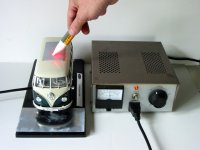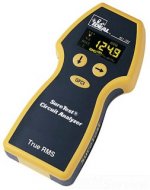Sorry to keep adding to the pile of posts on this thread, but two ideas occurred to me. First of all, we should establish some period of time to proactively change out the RV water heater element - Maybe every 5 years? An electrical test to see if they are electrically leaky is a little involved, and a visual inspection might miss the tiny pinholes that can cause electrical current leakage. This scheduled replacement is not as important in a home electric water heater, because its wiring is permanent and fixed.
The second idea is that this electrical leakage hazard cannot exist if there is no hot electric power to the water heater. Specifically keep the red water heater switch turned off unless you really need it. Think about just making hot water with propane.
You're tending to fixate on the hot-water heater failure, when that's not the real issue here. The primary problem is that the RV has obviously lost its safety ground bonding thru the power outlet. This allows the RV's chassis and body to float to whatever voltage ANY appliance connected to its electrical system will create. So if the safety-ground bond is broken, either from corroded/loose bonding screw in the RV's panel, a broken ground wire in the shore power cable/pigtail/dog-bone, or a loose/corroded/missing safety-ground wire in the power outlet it's plugged into, then replacing the water heater element pro-actively is like putting a band-aid on a bullet wound without removing the lead. If you don't have a continuous, low-impedance ground-fault path back to the campground's or house's service panel grounding-bond point, then the next time your microwave, toaster oven, fridge, stereo system, battery inverter/charger (anything, really) develops an internal electrical leakage with a fault-to-ground, your RV's chassis/skin will once again rise to 60 or 120 volts and present a shock hazard to anybody touching it.
If you have a properly grounded/bonded RV (via its shore power connection, NOT a ground rod driven in the earth next to it), then it should be impossible for any internal leakage failure of the RV's appliances or electrical system to create a hot-skin condition. Just can't happen.
Of course, GFCI's are supposed to detect fault currents that result from a person touching an energized object while "earthing" it, but remember at campgrounds GFCI's are typically only required on the 20 amp service, NOT the 30 and 50 amp services. That's means the pedestal won't offer you any active hot-skin safety on the 30/50 outlet. It only creates a passive ground/bond system that will drain away any currents created by appliance failure. Break that passive ground/bond connection FOR ANY REASON and you're now playing Russian Roulette the next time any appliance has an internal hot-to-chassis wiring condition from heat, vibration, or a wire pinched under a bolt. Since you can't replace and test the entire RV's electrical system and appliance every few years, then you're depending on the safety ground/bond to protect your life.
This is exactly how the electrical code was designed and written, and if it's followed then you should always be safe when touching your RV. But if you violate the code with non-existent safety grounds in your shore power outlet (the original OP's problem, I would guess) then you're risking the lives of your family and friends who touch your RV.
I'm sorry if this sounds like something nobody wants to worry about or that it seems too complicated, but when you plug your RV into ANYTHING, you personally become a junior electrician of sorts, and need to verify that the voltage and grounding is correct. Yes, if the campground's electrician (or the DIY guy who wired your garage outlet) did it correctly, and your shore power cords and adapters are regularly inspected and maintained, it shouldn't be an issue. But it only takes that 1 in a 1,000 chance to create the right conditions for an RV hot-skin. You can stretch those odds in your favor by visibly inspecting and quickly testing outlets for grounds and incorrect voltages before you plug in, and knowing that your should NEVER feel a shock from your RV. Electrical knowledge is power.
Much more on this later after the Hershey show.




